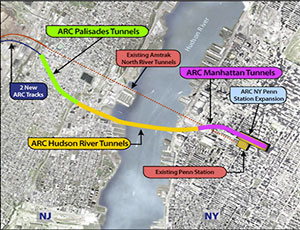Seeking to keep an endangered $8.7-billion trans-Hudson River rail tunnel plan alive, U.S. Transportation Secretary Ray LaHood has bought the project a little more time.

New Jersey Gov. Chris Christie [R] had announced Oct. 7 that he was killing the project. But after meeting with LaHood the following day in Trenton, Christie agreed to a two-week study of unspecified project "options".
Nevertheless, it remains to be seen whether the results of that study will convince Christie to do an about-face and give the plan a green light.
Supporters of the Access to the Region's Core (ARC) project envisioned it as providing new commuter-rail link between the Garden State and New York City and creating thousands of construction jobs.
But in announcing he was pulling the plug, Christie said he feared cost overruns that could cost the state between $2 billion and $5 billion, despite commitments of $3 billion each from the Federal Transit Administration and the Port Authority of New York and New Jersey.
All sides are now waiting for results of what LaHood called "a small working group," composed of U.S. Dept. of Transportation and New Jersey Transit officials, that is to study options for the project and report to Christie by about Oct. 22.
LaHood met with Christie in the Governor's office in Trenton, a DOT official says. FTA Administrator Peter Rogoff also attended the meeting.
Christie said in a statement after the meeting, "The fact that the ARC project is not financially viable and is expected to dramatically exceed its current budget remains unchanged." But he also said that LaHood had "presented several options to potentially salvage a trans-Hudson tunnel project."
In announcing just one day earlier that he was killing the project, Christie said, "I will not allow taxpayers to fund projects that run over budget with no clear way of how these costs will be paid for," Christie said. "The ARC project costs far more than New Jersey taxpayers can afford and the only prudent move is to end this project."
Construction had begun on the project last year, with Ferreira Construction of Branchburg, N.J., starting work on a $13.6-million underpass at Tonnelle Avenue in North Bergen, N.J. The underpass was adjacent to where the tunnel would have begun its descent under Palisades Mountain.
A $258.7-million contract for the Palisades segment of the tunnel was awarded in January to a joint venture of Schiavone Construction, Secaucus, N.J., Shea Construction, Walnut, Calif., and Skanska USA Civil of New York.
An additional $583-million contract for the Manhattan segment of the tunnel was awarded to a joint venture of Barnard of New Jersey, a unit of Barnard Construction of Bozeman, Mont., and College Point, N.Y.-based Judlau Contracting.
A tri-venture called the CM Consortium, consisting of Tishman Construction Corp., Parsons Transportation Group and ARUP--all based in New York--was handling construction management for the entire project, which was long-touted as a boon for the New York region's struggling construction industry. Advocates projected the tunnel would produce nearly 6,000 construction jobs.
Then, on Sept. 10, Christie halted the work to conduct a 30-day review of the project.
Christie said that study confirmed that costs were expected to exceed the current budget possibly by almost $6 billion. Moreover, the state would have been on the hook for any costs over the $8.7-billion budget agreed upon by NJ Transit, the Port Authority and the FTA.
According to a report filed to the Governor by his ARC Project Executive Committee, about $478 million in cash had been spent on the project as of Sept. 30.
In August, both the FTA and NJ Transit submitted updated project cost ranges in order to finalize a federal Full Funding Grant Agreement that needed to be reached before the project officially qualified for the $3-billion federal share.
NJ Transit estimated the project would cost between $8.7 billion and $10 billion while the FTA submitted a range of $10.9 billion to $13.7 billion.
Neither range included costs for the construction of a new $775-million railroad bridge which, according to the governor's office, was necessary for the operation of the railroad after the tunnel was finished.
After the 30-day review, the final agreed-upon range was between $11 billion and $14 billion, including the cost of the railroad bridge.
After Christie decided to cancel the project, Jack Kosis, chief executive officer for the Associated General Contractors of New Jersey, said, "We're disappointed to say the least, but on the other hand, we understand fiscal responsibility."
Kosis added, "If it's true that the tunnel is anticipated to be $11 billion to $14 billion and we only have $8.7 billion to play with, then we simply don't have the money."
Kosis said AGC is unsure on which elements of the project the overruns were projected to occur and that he is trying to obtain the data Christie used to make his determination.
He said, "We want to work with the governor to find ways to fund our construction, here, but until we know what was in that data we don't really know where they think the project was going to exceed the budget."

Post a comment to this article
Report Abusive Comment